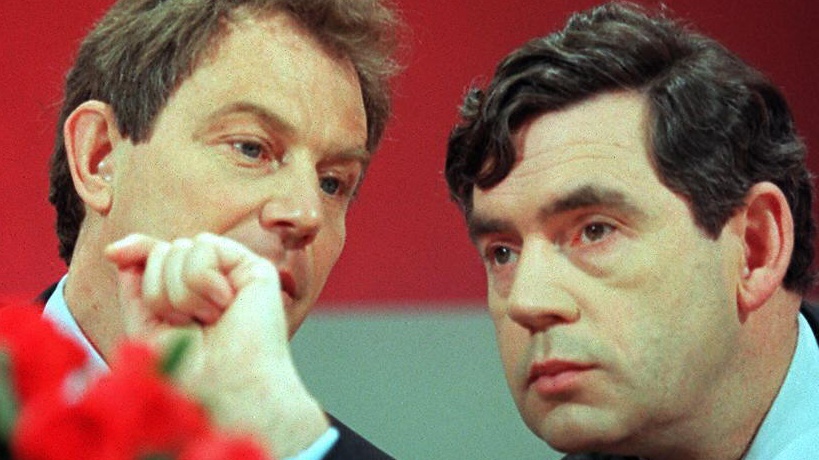Personality clash: the most bitter political rivalries in history
The Week looks at some of the most notable feuds between Britain’s parliamentary titans

Eyebrows have been raised around Westminster after it took Chancellor Rishi Sunak eight hours to tweet a message of support for Boris Johnson as “partygate” revelations threaten to topple his premiership.
On Wednesday, the prime minister faced MPs in a brutal Prime Minister’s Questions that saw him apologise for parties held at No. 10 while the country was in lockdown. But Sunak could not be seen in his usual spot in the Commons, and was instead pictured 200 miles away in Devon on a pre-arranged visit.
After eight hours of “public silence”, he then issued a “carefully worded” message on Twitter, said The Telegraph. Widely believed to be a potential successor as Conservative Party leader, Sunak’s “lukewarm” message said the PM was “was right to apologise” for attending a No. 10 garden party on 20 May 2020.
The Week
Escape your echo chamber. Get the facts behind the news, plus analysis from multiple perspectives.

Sign up for The Week's Free Newsletters
From our morning news briefing to a weekly Good News Newsletter, get the best of The Week delivered directly to your inbox.
From our morning news briefing to a weekly Good News Newsletter, get the best of The Week delivered directly to your inbox.
The “brevity of his message and its timing” has “aroused suspicion” at Westminster, said The Times, with some cabinet ministers taking it as “further evidence that Sunak is positioning himself to take over” from the prime minister should he be forced to resign.
With speculation over Sunak’s ambitions increasing by the day, The Week looks back at some of the greatest rivalries in modern political history.
1. William Gladstone and Benjamin Disraeli
One of the most bitter clashes of the 19th century was between great Liberal leader William Gladstone and his Conservative counterpart Benjamin Disraeli.
“There is no doubt that the two statesmen hated each other,” the BBC said, with Disraeli referring to Gladstone as “that unprincipled mania” and an “extraordinary mixture of envy, vindictiveness, hypocrisy and superstition” in private letters.
A free daily email with the biggest news stories of the day – and the best features from TheWeek.com
Gladstone was perhaps “more moderate” in his attacks on Disraeli, stating: “The Tory party had principles by which it would and did stand for bad and for good. All this Dizzy destroyed.”
Both would go on to serve as prime minister, with a persistent rumour that “the Queen greatly preferred” the flamboyant Disraeli over the more austere Gladstone, according to Encyclopedia Britannica.
2. Neville Chamberlain and Winston Churchill
Prime minister from 1937 to 1940, Neville Chamberlain pursued a policy of “appeasement” in response to the rise of Nazi Germany throughout the 1930s, a policy that Winston Churchill, then a Conservative backbencher, heavily criticised.
But Churchill had become an “increasingly marginalised voice” in the party despite his 40 years’ experience in parliament, and was easily “sidelined” by Chamberlain, said HistoryExtra.
At the time, Churchill was considered by many in the UK to be “a warmonger, an adventurer and an opportunist with poor judgement”, according to the Imperial War Museum.
But a reversal of fortunes came in 1940 when Chamberlain was forced to resign from his post following a “disastrous” military campaign in Norway. Now widely considered our greatest ever leader, Winston Churchill was “by no means the obvious choice for prime minister” when he was appointed to the role in 1940, but would go on to lead Britain to victory over Nazi Germany five years later.
3. Harold Wilson and Edward Heath
The bitter rivalry between the two greatest political titans of their times lasted for a decade as they fought against each other in four general elections, swapping the keys to No. 10 in the process.
Although they famously loathed each other, they were cut from the same cloth, said The Guardian.
“Both belonged to what may loosely be called the lower-middle-class and found their way by scholarships to grammar school and Oxford, where both were strikingly successful.”
Both also served stints in the civil service, as well as serving as prime minister in the tumultuous years between the mid-1960s and 70s.
4. Margaret Thatcher and Michael Heseltine
Michael Heseltine served in Margaret Thatcher’s cabinet as environment secretary and later was made defence secretary in a reshuffle just before the 1983 general election.
Three years later, however, Heseltine resigned his post in “spectacular fashion” after he stormed out of a cabinet meeting after disagreements over the Westland helicopter company – later dubbed the “the Westland affair”, said politics.co.uk.
He then “stuck the knife” into the woman who had promoted him to one of the great offices of state when he announced his candidacy for leader of the Conservative Party in 1990.
Heseltine was defeated by Thatcher, “but succeeded in inflicting what became a mortal blow to the then prime minister” who would resign as leader the following week, the site added.
5. Tony Blair and Gordon Brown
The bitter feud between Labour prime minister Tony Blair and his chancellor, Gordon Brown, was “dramatically exposed” to the public in 1998, said TotalPolitics.
Journalist Andrew Rawnsley revealed in his Observer column that a close Blair ally had told him that the then prime minister believed Brown had “psychological flaws”, said the site.
Alastair Campbell, Blair’s spokesperson during the New Labour years, later admitted he had “probably inspired” the description of Brown outlined in Rawnsley’s damning depiction of the pair’s relationship, said The Telegraph.
-
 High Court action over Cape Verde tourist deaths
High Court action over Cape Verde tourist deathsThe Explainer Holidaymakers sue TUI after gastric illness outbreaks linked to six British deaths
-
 The battle over the Irish language in Northern Ireland
The battle over the Irish language in Northern IrelandUnder the Radar Popularity is soaring across Northern Ireland, but dual-language sign policies agitate division as unionists accuse nationalists of cultural erosion
-
 Villa Treville Positano: a glamorous sanctuary on the Amalfi Coast
Villa Treville Positano: a glamorous sanctuary on the Amalfi CoastThe Week Recommends Franco Zeffirelli’s former private estate is now one of Italy’s most exclusive hotels
-
 Reforming the House of Lords
Reforming the House of LordsThe Explainer Keir Starmer’s government regards reform of the House of Lords as ‘long overdue and essential’
-
 The Board of Peace: Donald Trump’s ‘alternative to the UN’
The Board of Peace: Donald Trump’s ‘alternative to the UN’The Explainer Body set up to oversee reconstruction of Gaza could have broader mandate to mediate other conflicts and create a ‘US-dominated alternative to the UN’
-
 The high street: Britain’s next political battleground?
The high street: Britain’s next political battleground?In the Spotlight Mass closure of shops and influx of organised crime are fuelling voter anger, and offer an opening for Reform UK
-
 Is a Reform-Tory pact becoming more likely?
Is a Reform-Tory pact becoming more likely?Today’s Big Question Nigel Farage’s party is ahead in the polls but still falls well short of a Commons majority, while Conservatives are still losing MPs to Reform
-
 Asylum hotels: everything you need to know
Asylum hotels: everything you need to knowThe Explainer Using hotels to house asylum seekers has proved extremely unpopular. Why, and what can the government do about it?
-
 Taking the low road: why the SNP is still standing strong
Taking the low road: why the SNP is still standing strongTalking Point Party is on track for a fifth consecutive victory in May’s Holyrood election, despite controversies and plummeting support
-
 Gaza peace deal: why did Trump succeed where Biden failed?
Gaza peace deal: why did Trump succeed where Biden failed?Today's Big Question As the first stage of a ceasefire begins, Trump’s unique ‘just-get-it-done’ attitude may have proven pivotal to negotiations
-
 Five key questions about the Gaza peace deal
Five key questions about the Gaza peace dealThe Explainer Many ‘unresolved hurdles’ remain before Donald Trump’s 20-point plan can get the go-ahead